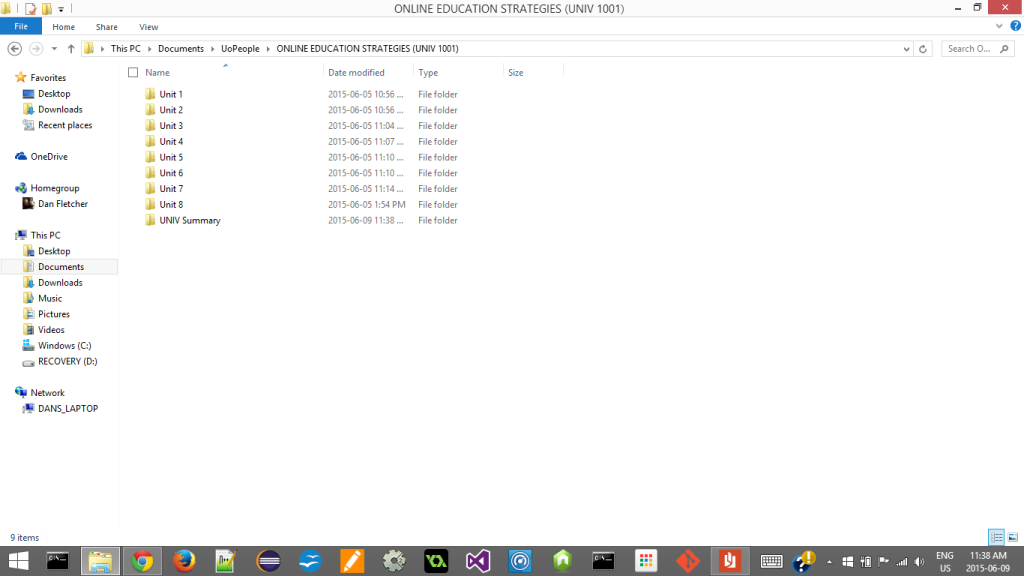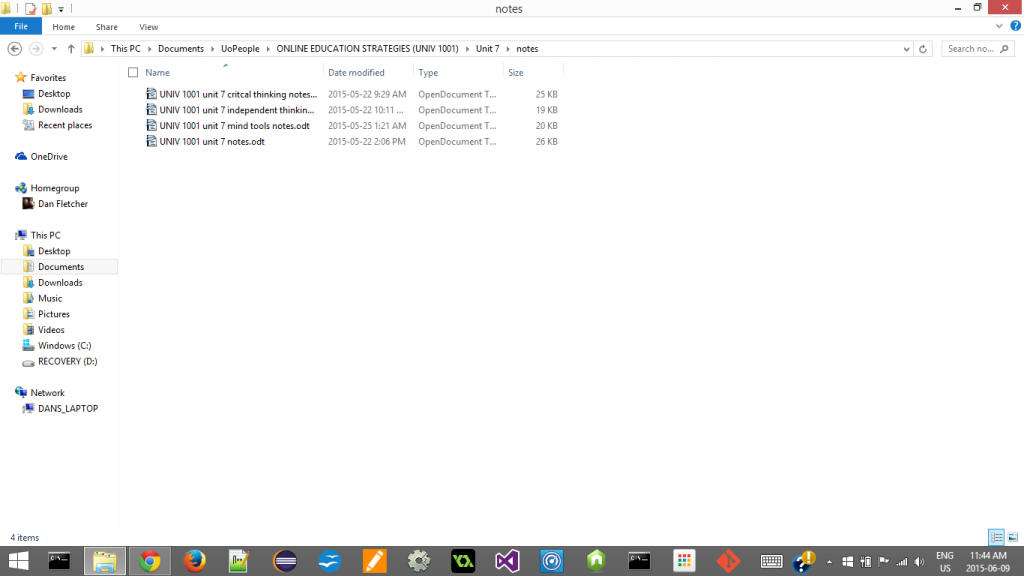I’ve gotten my grades back for my finals, and my grades couldn’t have been better! So, as promised I’ll share a little bit of my study, and preparation process for anyone interested in improving their grade.
Some of these tips will apply to anyone at any school, but others will be more specific to online courses – especially at University of the People. Some of these tips also won’t apply to math, science or some programming courses. I leave you up to decide which study tips apply to your personal situation the most.
Study Tip 1 – Get an Early Start.
This will apply to any course in any school. No matter how much you think you understand a lesson or lecture, as the course goes on, and you start focusing on new topics, you’re bound to forget some things by the end.
So, make sure to schedule some time in the beginning to review material before exam time! After every week’s assignments are completed, go back and review the material from previous weeks.
10 – 20 minutes is enough – don’t overburden yourself.
You don’t have to spend much time on this either. Just simply reviewing assignment questions, or any quizzes for 10-20 minutes is enough – don’t overburden yourself. The point is to keep the topics you learned fresh throughout your entire course, so that when it’s exam time, you’re not going back and trying to cram everything into your brain at once.
This brings me to my next study tip, specific to UoPeople or any other course that uses Moodle for the learning environment.
Study Tip 2 – Take advantage of the self-quiz!!!
Not only do the self-quizzes count towards your participation grade, they also offer an amazing study guide. Most of the questions in the self-quizzes are in the graded quizzes, and some make it into the final exam. This means just by looking at the questions in these quizzes you can get a better idea of which parts of your readings are most important to focus on.
Taking the self-quizzes offers you a way of prioritizing your notes, so that you don’t waste your precious time writing detailed notes on areas that you won’t be tested on during finals. Don’t underestimate them!
Use the self-quiz at least twice for every unit. Personally I found it best to write the self-quiz for each unit before doing the reading assignments, and then again after. This would help me understand what I might already know, and would help me measure how much I learned after completing the readings.
To find out more about how I start each week at University of the People click here.
Study tip 3 – Be a peer.
This is another one specific to UoPeople. Take advantage of the peer-to-peer learning model! I can’t stress this one enough. The best way to really learn something and not just memorize it, is to make connections and form opinions.
What better way to draw connections by participating in the class discussions? This goes beyond just posting your discussion assignments and rating your minimum 3 posts. Even if you only rate 3, read more about what others had to say about the same questions. Get some perspective, and try to explain yours in more detail to people who might not have understood you.
Another opportunity to take advantage of peer-to-peer learning is through the written assignments. When you are assessing someone’s work, try and think about a few different things.
- What can I learn from this student?
- What can I teach this student?
- How can provide insight or advice on this assignment?
Remember that even when you score a perfect grade, to leave feedback. It can be as simple as saying how much you appreciate their effort, or competence. But remember to try and think of at least one thing they can improve on. It not only helps them, but it also helps you by making you think more deeply about the assignment.
Study Tip 4 – Keep your notes organized.
It’s important – especially if your notes are on your computer like me – to keep your notes organized from the beginning. Make a folder for UoPeople on your computer, and then make a folder for each course you’re taking. Each course should be divided into units, and each unit should have assignments kept separate from your notes.
Above is a screenshot of one of my courses, UNIV 1001. Notice I have a folder for each unit, and then a folder for a course summary. Inside of each unit I have a folder for notes, and one for assignments.
Use my screenshots as an example for organizing your own notes, but feel free to do it your own way as well.
The point is to be able to retrieve specific information quickly. Organized notes, will save you a ton of time during the study process, and when exam week comes, it will feel so much less stressful!
Study tip 5 – Learning objectives.
Last one for the day but not least important. Pay close attention to the learning objectives for each unit!!! This could be the most important, I don’t know. But make sure at the beginning of each unit, you write down the learning objectives. These will be the questions that you will try to answer in your own words as you read the material.
The objectives force you to think critically and formulate your own opinions… you are more likely to retain what you learn.
Falling back on study tip number 1, these will be the center of your review throughout the course. Come back to these questions, and elaborate on them as you learn more about the subject.
At the end of the course I suggest making a document that lists all of the learning objectives, and leave out your previous answers. Go through and try to re-answer them in your own words again. This will give you a very good idea of what you need to review and what you don’t.
Understanding the learning objectives is what’s ultimately going to ensure you are prepared and ready for your final exam, as well as ensuring you actually learned something, rather than just memorizing facts.
The objectives force you to think critically and formulate your own opinions about the unit topics. By doing this, you are more likely to retain what you learn.
That’s all!
I may come up with more tips in the future as I progress throughout my own studies in school, but these tips should be a huge help for anyone who feels like they may have struggled in previous courses. (I hope they do).
I wish everybody good luck in our next term at UoPeople, and I look forward to seeing other students tips and suggestions in the comments below!
Cheers,
Dan














Have you considered using Evernote to keep track of your notes?
Hey Jessica, thanks for commenting!
No I didn’t consider using Evernote until now. Seems like a nice way to keep things organized, and you can never have too many backups. I’m definitely going to check it out, since you mentioned it.
It’s amazing how you made it to keep yourself that organized during our very first term here at UoPeople. While some of us may have struggled to find the right method to make it through from the first Unit to the last, yet you found the right strategy to go along the whole study process here. I thank you for sharing your method with us. The only concern is whether I am as skillful as you to organize as well as you do. A great blogger around the corner!
Thanks for the feedback Dieune!
Keeping files organized just takes practice. If you ever need any help, feel free to message me personally, and I’ll see what I can do to help. I might even post another article that addresses organization specifically.